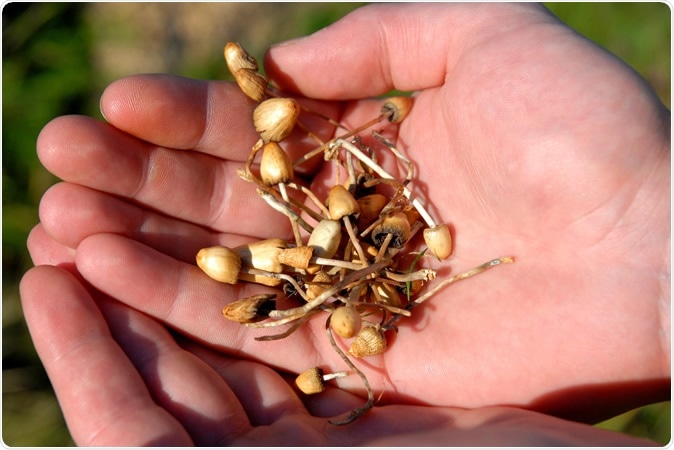Magic mushrooms are wild or cultivated mushrooms containing psilocybin, which is a naturally occurring hallucinogenic and psychoactive compound. A single dose of psilocybin provides long-term relief of anxiety and depression in cancer patients, a new study found.
A team of researchers at the New York University Grossman School of Medicine has found that a one-time, single dose of psilocybin, the compound found in psychedelic mushroom or magic mushroom, combined with psychotherapy, has been linked to a marked improvement in existential and emotional distress in patients with cancer. The drug’s effect has persisted for nearly five years after administration.
The study, published in the Journal of Psychopharmacology, highlights the efficacy of psilocybin in reducing anxiety levels and depression in cancer patients. Patients with cancer who received the compound reported reductions in anxiety, depression, demoralization, hopelessness, and death anxiety nearly five years after receiving a single dose of the drug and psychotherapy.

Hallucinogenic "magic" mushrooms. Image Credit: FREEDOMPIC / Shutterstock
Psilocybin effects
Psilocybin is a known hallucinogenic substance commonly found in mushrooms growing in South America, Mexico, Europe, and the United States. A schedule-I controlled substance, the compound has a high potential for abuse. However, people use it as a recreational drug, and over the past years, studies have analyzed its potential for medical purposes.
The compound has both positive and negative effects. It has been studied to relieve symptoms of anxiety and depression but has been known to trigger psychotic episodes. The drug has long been used recreationally due to its hallucinogenic effects, which work by altering a person’s perception, thoughts, and feelings.
Promising results
In the current study, the researchers conducted a long-term within-subjects follow-up analysis of self-reported symptomatology among 15 participants, who agreed to participate at an average of 3.2 to 4.5 years, following the administration of psilocybin.
The researchers noted that among the participants, about 60 to 80 percent of them had met the criteria for clinically significant anxiolytic or antidepressant responses after 4.5 years after receiving the drug. Further, 71 to 100 percent attributed positive life changes, thanks to the combination of psilocybin and psychotherapy treatment, rating it among the most spiritually significant and personally-meaningful experiences in their lifetime.
“These findings suggest that psilocybin-assisted psychotherapy holds promise in promoting long-term relief from cancer-related psychiatric distress. Limited conclusions, however, can be drawn regarding the efficacy of this therapy due to the crossover design of the parent study,” the researchers wrote on the paper.
“Nonetheless, the present study adds to the emerging literature base suggesting that psilocybin-facilitated therapy may enhance the psychological, emotional, and spiritual well-being of patients with life-threatening cancer,” they added.
The authors said psilocybin shows promise as an important tool for enhancing psychotherapy’s efficacy and eventually, providing relief for symptoms of anxiety and depression. While the exact mechanism on how psilocybin works are not fully understood, the researchers believe the drug makes the brain more receptive to new thought patterns and ideas.
It is also believed that the compound targets a brain network, called the default mode network, which becomes activated when individuals perform mind wandering and self-reflection. These activities aid in making sense of oneself and a sense of coherent narrative identity.
In most people with anxiety and depression, the said network becomes excessively active and has been tied to feelings of worry, rigid thinking, and rumination. The compound appears to work to shift the activity in the network, allowing people to have a broader perspective of their lives and behaviors.
The team plans to further conduct additional studies with bigger trials in patients who belong to diverse ethnic and socioeconomic populations. Also, they hope to conduct more studies on patients with advanced cancer-related psychiatric and existential distress.
Journal reference:
Agin-Liebes, G., Malone, T., and Yalch, M. et.al. (2020). Long-term follow-up of psilocybin-assisted psychotherapy for psychiatric and existential distress in patients with life-threatening cancer. Journal of Psychopharmacology. https://journals.sagepub.com/doi/abs/10.1177/0269881119897615?journalCode=jopa